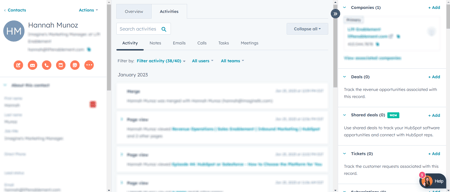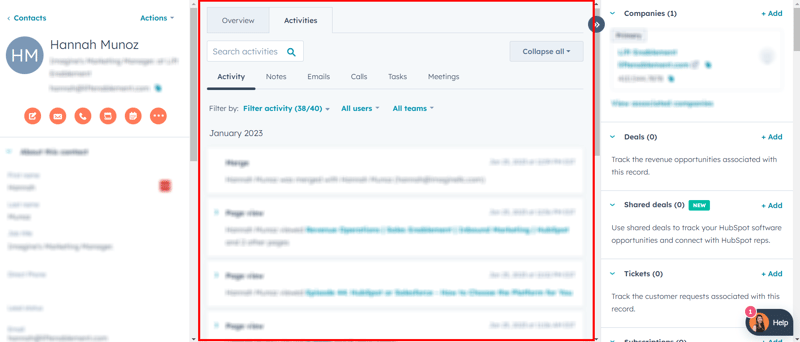Why HubSpot Contact and Company Records Are an Undervalued Marketing Tool
 Marketers often want to breeze through HubSpot’s contact/company records during training because they seem pretty self explanatory. Others see them more as “just a sales tool.” Company and contact records are normally overlooked, but in reality, they are a really valuable tool that can help you market well to prospects.
Marketers often want to breeze through HubSpot’s contact/company records during training because they seem pretty self explanatory. Others see them more as “just a sales tool.” Company and contact records are normally overlooked, but in reality, they are a really valuable tool that can help you market well to prospects.
That’s why today, I’m going to walk you through why contact and company records are useful for marketing and how to better use them overall.
Why Contact/Company Records are Important to Marketing
When training on the Marketing Hub, there are many times I notice clients not really connecting the dots as to why contact/company records are important. They usually have a glazed look, like, “This is cool, but it’s not really going to help me.” It’s true that marketers don’t sit around and dissect contact records the way a salesperson would, but contact/company records do serve an important purpose when we’re pulling lists and trying to nurture specific segments. That’s where the true magic of contact records can give us much needed information about whether our work is succeeding.
As an example, think of how we use personas. At first, we make a lot of assumptions and think we have them nailed down. Then, as contacts start interacting with our website or marketing assets, we can see whether our hypotheses were correct by using the activity timeline.

The activity timeline gives us better answers to questions such as:
- Are we sharing the right content?
- Is this content resonating?
- Is our content completely hitting or missing the mark?
From an initial standup, this feature may not be something you’re using every day, but as you start to collect data, these records can be a very useful and powerful resource.
Contact records can also help bridge the gap between sales and marketing. For example, when people are interacting with your website, paying attention to the contact activity timeline can signal when a salesperson can take over and start reaching out to the contact. If a salesperson knows exactly what you’ve done on the marketing side, they can see in the stored data if someone already received content like a PDF. While this doesn’t directly benefit marketers, it adds value to the job, especially from the eyes of the sales team.
Features Marketers Should be Aware of Within Contact/Company Records
Many people overlook items within contact records such as activity dates. Most are hyper-focused on new leads, so everything that comes into the system looks a little like this: “Oh they downloaded an eBook, so we need to push them through the funnel right now!”
Here’s the danger of that approach: in most cases like this, someone who downloaded an eBook is then pushed into a workflow to get more content around the same topic. Once that workflow ends, they receive nothing else and the person falls through the cracks. Instead, it would be more beneficial to use the contact/company records to look at the last time someone engaged. That would be beneficial because it would show if they’re truly interacting with us or if they were more of a one-and-done type of contact.
By skipping the records step, marketers are missing out on segmenting. The mistake in the eBook example was that they just used the premium piece to segment; they didn’t try to put those leads into lists or categories.
Marketers should be using personas or customer properties to help get leads broken down into marketable segments—because, believe it or not, your leads don’t want information on just one topic.
Utilizing the features available with contact records (properties, activity dates, segments) is becoming more and more important. It continues to shock us that companies don’t have a thought process or structure in place to use them!

To be successful, you have to use all the tools in your back pocket and with the Marketing Hub, one of those tools is the company/contact records. If you aren’t using them to find ways to segment your contacts or incorporate properties measuring the level of importance or impact that person has on your company, you’re missing out on a big opportunity.
Next time you go into your HubSpot account, take some time to figure out how those records can work more to your goals and stop looking at them as just a sales tool.

.png)
.png)




